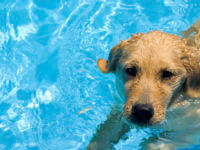Your adult dog keeps having accidents in the house—but why? And how can you help them learn to hold their potty? Dogs sometimes have accidents because of behavioral issues, but the problem is likely correctable through proper training at home.
The following tips should help, although if your pet still has problems after trying to use crate training and rewards, bring them in for an exam with our experienced veterinarians. Though the issue is most likely behavioral, frequent accidents may point to a larger issue that should be checked out.
Start slow.
If you need your pet to hold their potty for a specific length of time, for example during the day while you are at work, don’t expect them to be able to hold it for nine hours right out of the gate. Work with your pet to gradually increase the length of time between trips outside. Use commands when they are out so they know now is their prime time to go.
Use rewards.
Dogs learn best from rewards, not punishment. Instead of flipping out when Fido has an accident, focus on praising him when he goes potty outside on command. Your dog wants to please you, so let him know when he as done well and he will be incentivized to keep doing what you want.
Crate train.
Crate training can be a great way to teach your dog when they are not supposed to go potty. When they are in a correctly sized crate, dogs won’t want to soil their space. Gradually increasing time in a crate will help them learn how to control their potty for longer periods.
What is the dog’s age and size?
Remember that puppies, older dogs, and smaller breeds generally can’t hold their potty as long. When estimating how long you think your dog should be able to wait, try to be considerate. How long can you wait to use the bathroom? How long should your grandfather be expected to wait? Have compassion where necessary and consider your pet’s needs.
If your senior dog begins having frequent accidents, bring them in for a checkup with your vet clinic or pet clinic. At LazyPaw Animal Hospitals, we help owners understand their aging pets and find strategies to cope with their different needs.


